Within the scope of SST 2024 in Osijek, a special RF spectrum management and monitoring session took place
ZAGREB, 17 October 2024 - As part of the 6th International Conference on Smart Systems and Technologies 2024 (SST), held from 16 to 18 October in Osijek, and organised by the Faculty of Electrical Engineering, Computing and Information Technology (FERIT), the Croatian Regulatory Authority for Network Industries (HAKOM) hosted a special session on Thursday focused on RF spectrum management and control.
The radio frequency spectrum is the primary resource for information transmission used by mobile communication networks. Due to the rapid development of communication systems and the electronic communications market, there is an ever- increasing demand for larger frequency resources and more efficient use of the radio frequency spectrum.. These demands drive the development of new trends and give rise to new challenges and issues for operators, users, and national regulatory bodies alike.
The implementation and rollout of 5G networks have raised increasing concerns and questions about the methods used to measure non-ionising radiation from these mobile communication networks. The differing purposes, complexities, and applicability of various measurement techniques present numerous challenges that measurers face daily. Additionally, the issue of service quality in mobile networks remains a prominent topic. Growing user demands for superior service have significantly heightened the pressure on mobile network operators, driving them to continually optimise and upgrade their infrastructure.
What are the key network parameters that need to be measured and optimised? What are the results of the measurement campaign of key network parameters? What challenges do measurers face when measuring non-ionising radiation levels of 5G mobile communication networks? What are the challenges of cross-border coordination? These are just some of the questions addressed by the presenters.
In the introductory part, Dr Ana Katalinić Mucalo, Assistant Director of HAKOM, presented the latest trends in RF spectrum management. HAKOM's spectrum control experts, Mario Gal, who presented the results of quality measurements in mobile communications, and Josip Milanović, who discussed the ever-popular topic of electromagnetic field levels, spoke about HAKOM’s measurement practices and the challenges faced in the field. Alberto Teković, a specialist in radio network optimisation at A1 Croatia, explored the complexities of implementing networks in border areas, using a specific case study to illustrate the issues."
For additional information please contact:
Croatian Regulatory Authority for Network Industries (HAKOM)
- Roberta Frangeša-Mihanovića 9 Street
- 10110 Zagreb, Croatia
- Tel. + 385 (0) 1 700 70 07
- Fax + 385 (0)1 700 70 70
Media inquiries can be submitted online using HAKOM’s official website: www.hakom.hr
About Hakom
HAKOM - Croatian Regulatory Authority for Network Industries – ensures preconditions for a fair market competition, stable growth and environment for innovations in the electronic communications and postal services market. HAKOM protects users’ interests and the possibility of choice among various communications and postal services at affordable prices, defines sustainable competitive conditions for operators and service providers under fair conditions for return on investment, and provides support to economic growth, public services and the quality of life in the Republic of Croatia by using modern technologies. HAKOM’ strategic goals are: to promote regulation of the electronic communications and postal services market, to support growth of investments and innovations in the electronic communications and postal services market, to provide efficient use of limited resources, to accelerate the growth of broadband products and services, to provide affordable offers of communications and postal services, to provide protection and informing of users, to build an efficient and comprehensive information system, to define and implement efficient processes, and to acquire multi-disciplinary expertise in market regulation.


